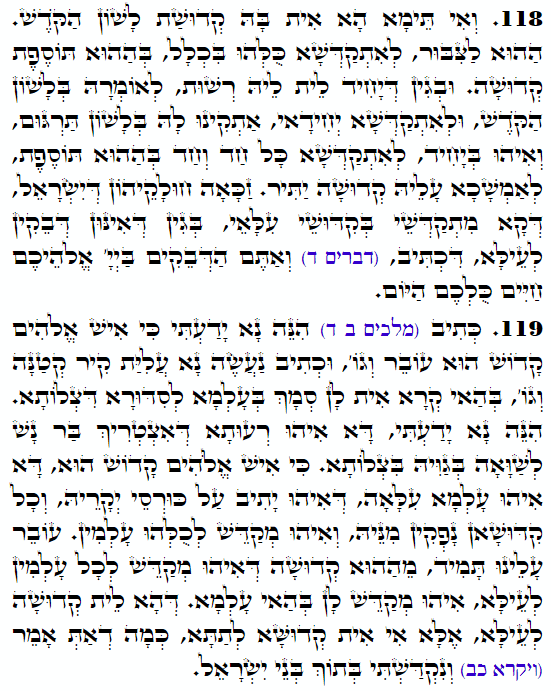Daily Zohar # 3860 – Terumah – Make a little walled upper room
Daily Zohar 3860

Hebrew translation:
119. כָּתוּב, (מלכים-ב ד) הִנֵּה נָא יָדַעְתִּי כִּי אִישׁ אֱלֹהִים קָדוֹשׁ הוּא עֹבֵר וְגוֹ’. וְכָתוּב, נַעֲשֶׂה נָּא עֲלִיַּת קִיר קְטַנָּה וְגוֹ’. בְּפָסוּק זֶה יֵשׁ סֶמֶךְ בְּעָלְמָא לְסִדּוּר הַתְּפִלָּה. הִנֵּה נָא יָדַעְתִּי – זֶהוּ הָרָצוֹן שֶׁצָּרִיךְ אָדָם לָשִׂים בְּתוֹכוֹ בַּתְּפִלָּה. כִּי אִישׁ אֱלֹהִים קָדוֹשׁ הוּא – זֶהוּ הָעוֹלָם הָעֶלְיוֹן, שֶׁיּוֹשֵׁב עַל כִּסֵּא כְבוֹדוֹ, וְכָל הַקְּדֻשּׁוֹת יוֹצְאוֹת מִמֶּנּוּ, וְהוּא מְקַדֵּשׁ אֶת כָּל הָעוֹלָמוֹת. עֹבֵר עָלֵינוּ תָּמִיד – מֵאוֹתָהּ קְדֻשָּׁה שֶׁהוּא מְקַדֵּשׁ אֶת כָּל הָעוֹלָמוֹת לְמַעְלָה, הוּא מְקַדֵּשׁ אוֹתָנוּ בָּעוֹלָם הַזֶּה. שֶׁהֲרֵי אֵין קְדֻשָּׁה לְמַעְלָה אֶלָּא אִם יֵשׁ קְדֻשָּׁה לְמַטָּה, כְּמוֹ שֶׁנֶּאֱמַר וְנִקְדַּשְׁתִּי בְּתוֹךְ בְּנֵי יִשְׂרָאֵל.
.
Zohar Terumah
Continued from previous DZ
#118
The third Kedusha includes parts in the sacred language, Hebrew. It is made so the congregation can sanctify themselves with the additional Kedusha. An individual cannot recite the Kedusha when it is only in the sacred language, so they made it in Aramaic and Hebrew to give the individual the ability to draw from the supernal holiness.
Deuteronomy 4:4
“וְאַתֶּם הַדְּבֵקִים בַּיהוָה אֱלֹהֵיכֶם חַיִּים כֻּלְּכֶם הַיּוֹם.”
“But you who held fast to YHVH your God are alive today, every one of you.”
Israel is blessed for having the ability to connect to the Holy Name and receive holiness.
#119
2 Kings 4:9,10
“וַתֹּאמֶר אֶל אִישָׁהּ הִנֵּה נָא יָדַעְתִּי כִּי אִישׁ אֱלֹהִים קָדוֹשׁ הוּא עֹבֵר עָלֵינוּ תָּמִיד.”
“נַעֲשֶׂה נָּא עֲלִיַּת קִיר קְטַנָּה וְנָשִׂים לוֹ שָׁם מִטָּה וְשֻׁלְחָן וְכִסֵּא וּמְנוֹרָה וְהָיָה בְּבֹאוֹ אֵלֵינוּ יָסוּר שָׁמָּה.”
“And she said to her husband, “Look now, I know that this is a holy man of God, who passes by us regularly.”
“Please, let’s make a little walled upper room, and let’s set up a bed for him there, and a table, a chair, and a lampstand; then it shall be, when he comes to us, that he can turn in there.”
The woman from Shunem recognized the holiness of Elisha the prophet and wished to set him a room in their home.
The Zohar explains the spiritual codes concealed in these verses.
“Look now, I know”, represents the desire that a person needs to inject in his prayer.
“This is a holy man of God”, represents the supernal world, Zeir Anpin that sits on his throne and all Kedushot come out of him to sanctify all worlds.
“Who passes by us regularly”, means the Kedusha that sanctifies the upper worlds, and the lower world of Malchut.
When there is a desire for holiness on the lower level, holiness comes down from the upper levels as it is written;
Leviticus 22:32
“וְלֹא תְחַלְּלוּ אֶת שֵׁם קָדְשִׁי וְנִקְדַּשְׁתִּי בְּתוֹךְ בְּנֵי יִשְׂרָאֵל אֲנִי יְהוָה מְקַדִּשְׁכֶם.”
“You shall not profane My holy name, but I will be hallowed among the children of Israel. I am YHVH who sanctifies you,”
Lesson;
The Light we receive in this world is based on our desire and the prayer that we use to connect. When we desire holiness, we use the Kedusha prayer to draw this light.
The Torah is like the holy man of God, which is Zeir Anpin. When we make room for Torah studies in our home, we draw holiness into our lives.
{||}

 Previous: Terumah
Previous: Terumah

